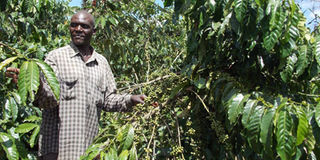Why Lwanga chose to grow clonal coffee

Charles Lwanga picks only red and ripe coffee beans. Right, the farmer stands at the edge of a deep containing water, urine, and cow dung. PHOTO By Michael J Ssali
What you need to know:
- Charles Lwanga makes about Shs150m a year from coffee. In an interview with Seeds of Gold’s Michael J Ssali, Lwanga says he has also diversified since into dairy farming and he projects to collect 60 litres of milk daily.
When Seeds of Gold visited Charles Lwanga at Manja village, Kisekka Sub-county in Lwengo District he was busy working in the nursery bed, checking if the cloned Robusta coffee plantlets were well watered. “I cannot avoid examining them because sometimes the people employed to do the work are not careful enough,” he says.
“Yet as a seed dealer and farmer I have a duty to give out good quality plantlets.”
Nursery
He employs three young men to work in the nursery bed which produces 70,000 cloned Robusta coffee plantlets every year.
The well potted and leafy plantlets were each about a foot tall and ready for planting. “My nursery bed is like a shop,” he explained. “I have to ensure that I have plantlets to sell all the time.”
Market
His customers nowadays come from the entire Masaka region of six districts, including Kalangala, and he says the demand for his plantlets is on the increase. Each plantlet at his nursery bed costs Shs1,000. He makes Shs70m per annum. The 50-year-old farmer used to be a trader in Kinoni Town along Masaka-Mbarara Highway but about 14 years ago, he discovered he could make more money as a coffee farmer and seed producer. “My grandfather, Mathias Nkumbi, was a coffee farmer. Actually the name Nkumbi means a hoe in our Luganda language. My father too was a coffee farmer and a coffee trader, so I grew up in a coffee environment. When he died I inherited his land measuring about nine acres,” he says.
Background
Before making the final decision to go into full time farming, he had planted some 300 cloned Robusta coffee trees on his inherited land next to the traditional Robusta coffee trees that his father used to grow. “When I finally set out to be a fulltime coffee farmer, my first observation was that I harvested an average of 14 kilogrammes of dry coffee beans from each cloned Robusta coffee tree while I picked six kilogrammes from each traditional Robusta coffee tree. I therefore decided to cut down all the traditional coffee trees and replace them with the cloned Robusta coffee trees,” says Lwanga before adding. “My main challenge however was to get the plantlets because I did not have the cash to buy them. I therefore took a short course at the District Agricultural Training and Information Centre Kamenyamiggo in which I got some training in making cloned coffee plantlets. The 300 trees that I already had on the farm served as my mother garden from which I obtained the clones and I set off making plantlets for my planned coffee farm.”
Zero grazing
About three months ago, Lwanga bought three Friesian cows for zero grazing. The cattle shade has a cement flow constructed in such a way that all the cattle urine flows into a pit where it is stored. The cow dung is collected every morning and buried in shallow holes between coffee tree rows.
Whenever the cattle shade floor is washed, the water flows into the same pit where the urine is stored. It is into the same pit that the rain water from the iron sheet roof of the cow’s shade flows. “That mixture of water, cattle urine, and cow dung is very good manure when used for irrigation of growing coffee plantlets,” Lwanga said.
“I purchased those cows with the sole purpose of conserving their droppings and urine.” He wants them very well fed and it is the reason he has planted rows of elephant grass along the edges of his farm. As a measure of climate change mitigation, Lwanga has dug trenches and shallow holes that trap runoff rainwater.
Robusta beans
A kilogramme of dry Robusta beans currently sells at about Shs3,000. Recently he bought some four acres of land from one of his neighbours on which he plans to plant more coffee.
“I find this kind of business much more paying than the petty trading that I was engaged in before,” he told Seeds of Gold.
He is not quite willing to disclose exactly how much money he earns in a year but it is not hard to estimate that his gross income is as high as Shs150m. (Shs70m from the sale of plantlets and over Shs40m from the coffee bean sales).
“It is good to be doing open air business like farming and on personal premises where I don’t have to worry about daily transport to and from my place of work like many people in formal employment do,” he explains.




